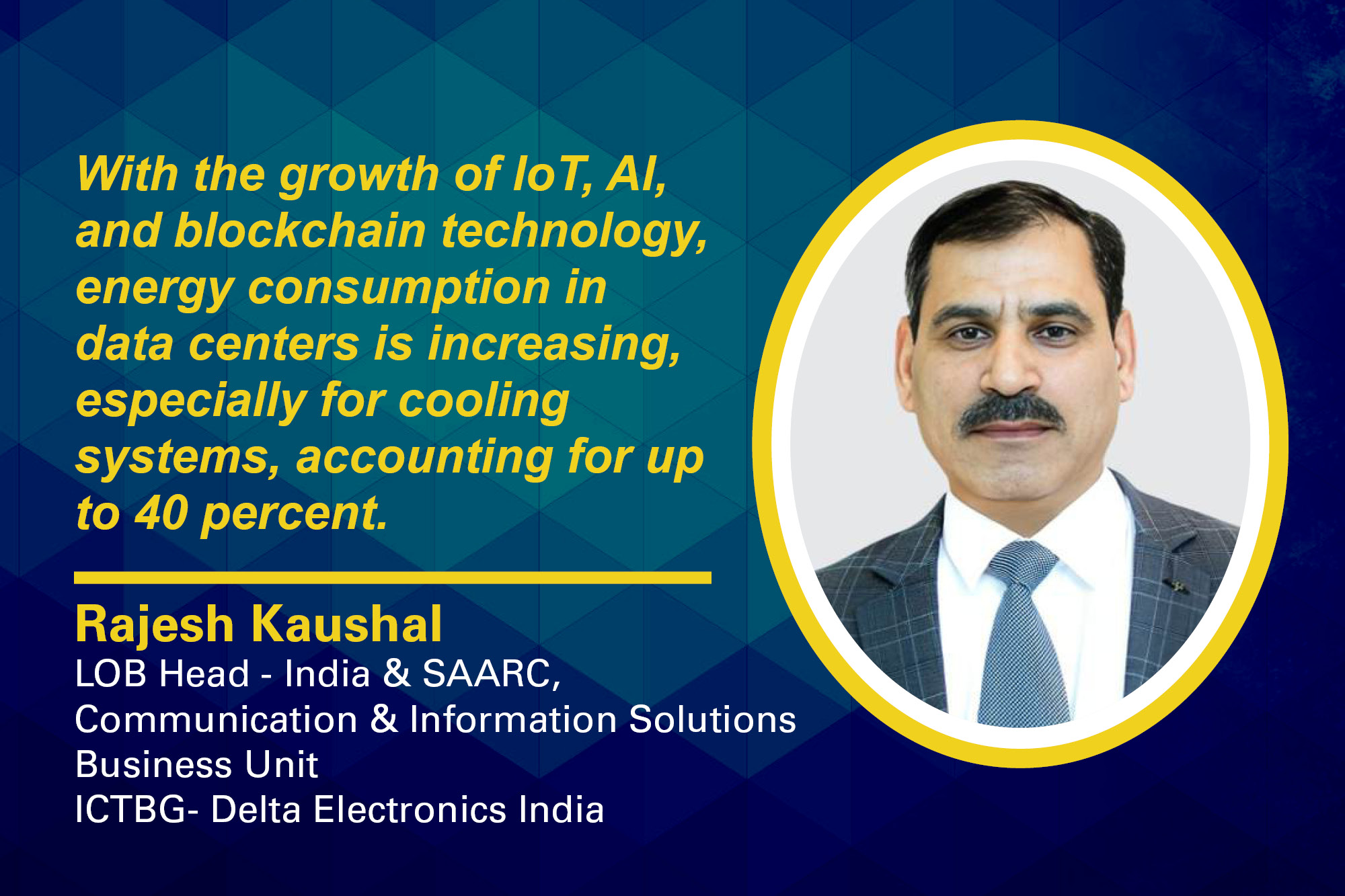Data Center energy demand rising amid global internet, AI growth
By Staff Report September 25, 2024 5:37 pm IST
By Staff Report September 25, 2024 5:37 pm IST

With the growth of IoT, AI, and blockchain technology, energy consumption in data centers is increasing, especially for cooling systems, accounting for up to 40 per cent.
Rajesh Kaushal, LOB Head – India & SAARC, Communication & Information Solutions Business Unit | ICTBG- Delta Electronics India
As data centers drive global internet connectivity, their rising energy demands pose environmental challenges. Innovative strategies and technologies are crucial for transitioning to sustainable power solutions while ensuring reliable operations. Industrialist Rajesh Kaushal talks with the EPR to explain the latest trends in the sector.
How can data centers can improve energy efficiency and sustainability?
Data centers are considered the “brains” of the internet. They process, store, and communicate data and power essential services like streaming, email, and social media. These centers use electricity to power their servers, storage drives, and other IT devices. On average, servers and cooling systems use the most electricity in data centers, followed by storage drives and network devices.
As global internet use increases, demand for data center services rises, causing concerns about their growing energy consumption. New tech like AI, which uses large amounts of computing power, could further boost demand.
Millions of data centers worldwide, with their energy-hungry facilities, consume more resources than entire countries, raising concerns about their environmental impact. With the growth of IoT, AI, and blockchain technology, energy consumption is increasing, especially for cooling systems, which can account for up to 40 percent of a data center’s total consumption.
Managing high energy needs while transitioning to renewable energy in data centers, especially in regions with strained power grids, involves several key strategies. First, improving energy efficiency through advanced cooling systems and server virtualisation can significantly reduce power consumption. Installing on-site renewable energy sources, like solar panels or wind turbines, decreases grid dependence. Energy storage solutions, such as battery systems, allow storing excess renewable energy for later use. Participating in demand response programs provides financial incentives for reducing power usage during peak times. Additionally, hybrid energy solutions combine renewable and traditional sources for stability while energy management systems optimise real-time energy consumption. Finally, geographic diversification helps balance loads and enhance renewable energy utilisation across multiple locations.
How do Delta UPS systems enhance energy efficiency in data centers?
With its wide range of Uninterruptible Power Supplies (UPS), Delta offers a competitive edge to businesses in need of first-rate power solutions. Delta UPSs are designed to ensure the protection of clients’ mission-critical applications by maintaining a steady flow of energy under adverse circumstances.Delta Electronics has been integrating several cutting-edge technologies into its Uninterruptible Power Supply (UPS) systems to optimise energy use in data centers. Some of the latest advancements are high-efficiency UPS, modular design, and Li-ion batteries. The smart energy management with remote monitoring and eco mode integrated power distribution fully redundant, configuration design and easily expandable without requiring additional hardware is also one of the latest advancements by Delta.
Delta’s UPS systems utilise advanced power conversion technologies that achieve high efficiency, often exceeding 96 percent, reducing energy losses during operation. By incorporating these technologies, Delta Electronics enhances the energy efficiency and reliability of UPS systems, contributing to overall sustainability in data centers.
How does Delta ensure reliability and resilience in energy storage?
With state-of-the-art power conversion and energy storage technologies, Delta offers high-efficiency power conditioning capabilities for demand management, power dispatch, renewable energy smoothing, etc. We integrate bi-directional power conditioning and battery devices, site controllers, and a cloud management system to provide comprehensive energy storage for residential, commercial and utility applications. Our Li-ion battery portfolio covers cells, modules (24V, 48V), cabinets (indoor/outdoor) and containers, offering customers excellent scalability and adaptability to various requirements. I would also like customised pack design for you to take a look at. The advantages of this are – increased reliability and resilience and integration of diverse resources such as wind and solar. Also, some of the benefits of energy storage are reduced environmental impacts by maintaining the balance by storing the unutilised energy and cost efficiency.
How are innovative solutions addressing RE challenges at data centers?
Data centers face several challenges in transitioning to renewable energy, particularly energy storage, economic constraints, infrastructure issues, and land use conflicts.
Energy storage is vital due to the intermittent nature of renewable sources like wind and solar. Although advancements in battery technology have improved, the sustainability challenges and environmental costs associated with mining for precious metals and rare earth minerals remain significant concerns. Economically, the shift from fossil fuels to renewables demands considerable investment. More financial backing from governments and major corporations can slow progress, prompting the exploration of alternative funding mechanisms such as crowdfunding.
Infrastructure also poses a challenge; many regions need more reliable, large-scale energy grids supporting widespread renewable energy use. These power grids are often underfunded and poorly maintained, struggling to meet the rising demand driven by increasing domestic consumption, electric vehicle adoption, and industrial transitions. Additionally, land use conflicts arise when renewable installations, such as solar farms and wind turbines, encroach on valuable agricultural land. Offshore wind projects present a potential solution, albeit at a higher cost. To create a more sustainable future, overcoming these challenges requires concerted efforts from governments, the energy sector, and data center operators.
We use cookies to personalize your experience. By continuing to visit this website you agree to our Terms & Conditions, Privacy Policy and Cookie Policy.